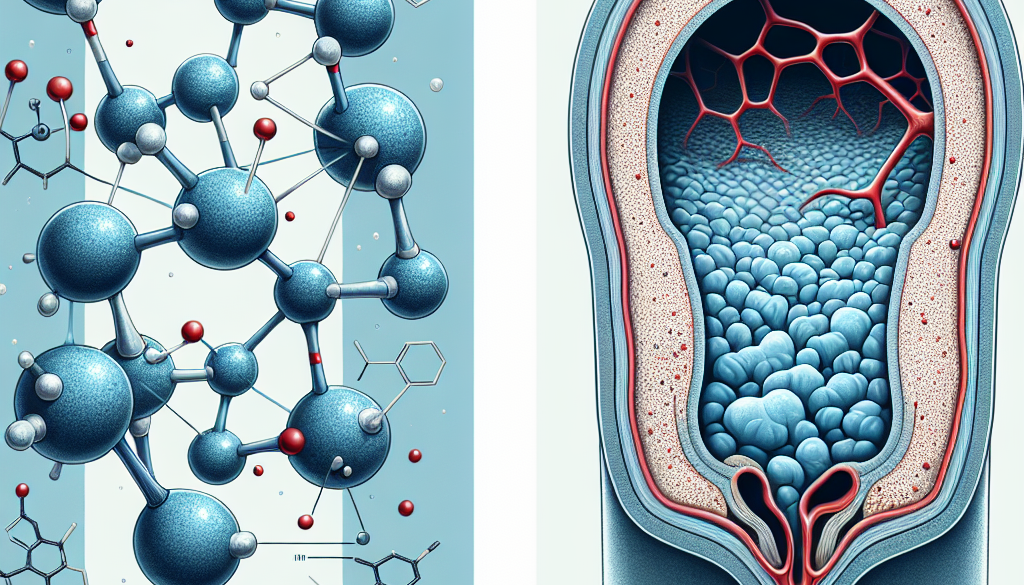Chondroitin Sulfate Atherosclerosis: The Connection
-
Table of Contents
- Chondroitin Sulfate and Atherosclerosis: Exploring the Link
- Understanding Atherosclerosis
- The Role of Chondroitin Sulfate in the Body
- Chondroitin Sulfate and Atherosclerosis: The Connection
- Research Findings and Clinical Implications
- Case Studies and Statistics
- Conclusion: Key Takeaways
- ETchem’s High-Quality Protein Products
Chondroitin Sulfate and Atherosclerosis: Exploring the Link
Atherosclerosis, a condition characterized by the hardening and narrowing of the arteries, is a leading cause of heart disease and stroke. It is a complex process involving inflammation, cholesterol deposition, and cellular proliferation within the arterial walls. Recent research has shed light on the potential role of chondroitin sulfate, a naturally occurring molecule, in the development and progression of atherosclerosis. This article delves into the connection between chondroitin sulfate and atherosclerosis, examining the evidence and implications for treatment and prevention.
Understanding Atherosclerosis
Atherosclerosis is a progressive disease that can begin as early as childhood and develop silently over decades. It is typically characterized by the following stages:
- Endothelial injury and dysfunction
- Accumulation of lipids, particularly low-density lipoprotein (LDL) cholesterol
- Inflammatory response and recruitment of immune cells
- Formation of fibrous plaques
- Plaque rupture and thrombosis, leading to acute cardiovascular events
Understanding the mechanisms behind atherosclerosis is crucial for identifying potential therapeutic targets and developing effective treatments.
The Role of Chondroitin Sulfate in the Body
Chondroitin sulfate is a sulfated glycosaminoglycan (GAG) composed of repeating disaccharide units. It is an important structural component of cartilage and provides much of its resistance to compression. In addition to its role in joint health, chondroitin sulfate is involved in various biological processes, including:
- Cell signaling
- Regulation of cell growth and differentiation
- Modulation of enzyme activities
- Interaction with growth factors and cytokines
Given its widespread presence and diverse functions, researchers have investigated the potential impact of chondroitin sulfate on cardiovascular health.
Chondroitin Sulfate and Atherosclerosis: The Connection
Emerging evidence suggests that chondroitin sulfate may play a role in the development of atherosclerosis. The connection between chondroitin sulfate and atherosclerosis can be understood through several mechanisms:
- Inflammation: Chondroitin sulfate has been shown to possess anti-inflammatory properties, which could potentially reduce the inflammatory response within atherosclerotic plaques.
- Lipid Metabolism: Some studies indicate that chondroitin sulfate may influence lipid metabolism, potentially affecting the accumulation of cholesterol in the arterial walls.
- Cell Adhesion: Chondroitin sulfate can modulate the adhesion of monocytes to endothelial cells, a key step in the initiation of atherosclerosis.
- Calcification: There is evidence that chondroitin sulfate may be involved in the calcification process of atherosclerotic plaques, which contributes to their stability and potential for rupture.
While the exact role of chondroitin sulfate in atherosclerosis is still being elucidated, these potential mechanisms highlight its significance in the disease process.
Research Findings and Clinical Implications
Several studies have investigated the effects of chondroitin sulfate on atherosclerosis with varying results. Some clinical trials have suggested that supplementation with chondroitin sulfate may lead to improvements in vascular function and a reduction in markers of atherosclerosis. However, other studies have not found significant benefits.
For example, a study published in the Journal of Vascular Research found that chondroitin sulfate inhibited the formation of atherosclerotic lesions in animal models. Another study in the American Journal of Cardiology reported that chondroitin sulfate supplementation improved arterial elasticity in humans.
Despite these promising findings, more research is needed to fully understand the therapeutic potential of chondroitin sulfate in atherosclerosis. It is also important to consider the quality and source of chondroitin sulfate supplements, as these factors can influence their efficacy.
Case Studies and Statistics
Case studies and epidemiological data provide additional insights into the relationship between chondroitin sulfate and atherosclerosis. For instance, populations with higher dietary intake of chondroitin sulfate, such as those consuming more fish and poultry, may have lower rates of atherosclerotic diseases. However, these observations must be interpreted with caution, as they do not establish causation.
Statistics from the World Health Organization (WHO) indicate that cardiovascular diseases are the number one cause of death globally, with atherosclerosis being a major contributor. This underscores the importance of exploring all potential avenues for prevention and treatment, including the role of chondroitin sulfate.
Conclusion: Key Takeaways
The connection between chondroitin sulfate and atherosclerosis is a burgeoning area of research with significant implications for cardiovascular health. While the evidence suggests that chondroitin sulfate may have beneficial effects on atherosclerosis, further studies are necessary to confirm these findings and determine the optimal use of chondroitin sulfate supplements. The potential for chondroitin sulfate to serve as a preventive or therapeutic agent against atherosclerosis offers hope for reducing the burden of cardiovascular diseases.
ETchem’s High-Quality Protein Products
For those interested in exploring the benefits of chondroitin sulfate and other protein supplements, ETchem offers a range of high-quality products. Their portfolio includes marine collagen, fish collagen, bovine collagen, chicken collagen, and various types of collagen (I, II, III), catering to diverse needs in the nutraceutical, pharmaceutical, cosmeceutical, and food and beverage industries.
ETchem’s commitment to quality and customer satisfaction makes them a preferred choice for businesses seeking reliable protein products. To learn more about their offerings or to request samples, contact ETchem at karen(at)et-chem.com.
About ETChem:
ETChem, a reputable Chinese Collagen factory manufacturer and supplier, is renowned for producing, stocking, exporting, and delivering the highest quality collagens. They include marine collagen, fish collagen, bovine collagen, chicken collagen, type I collagen, type II collagen and type III collagen etc. Their offerings, characterized by a neutral taste, instant solubility attributes, cater to a diverse range of industries. They serve nutraceutical, pharmaceutical, cosmeceutical, veterinary, as well as food and beverage finished product distributors, traders, and manufacturers across Europe, USA, Canada, Australia, Thailand, Japan, Korea, Brazil, and Chile, among others.
ETChem specialization includes exporting and delivering tailor-made collagen powder and finished collagen nutritional supplements. Their extensive product range covers sectors like Food and Beverage, Sports Nutrition, Weight Management, Dietary Supplements, Health and Wellness Products, ensuring comprehensive solutions to meet all your protein needs.
As a trusted company by leading global food and beverage brands and Fortune 500 companies, ETChem reinforces China’s reputation in the global arena. For more information or to sample their products, please contact them and email karen(at)et-chem.com today.





